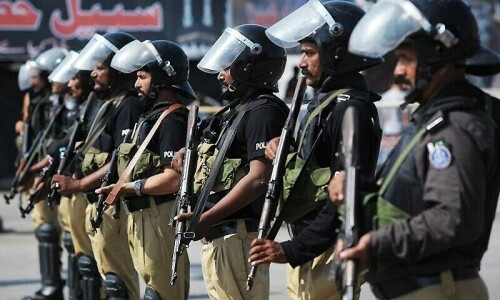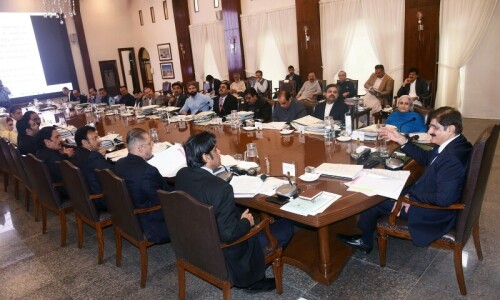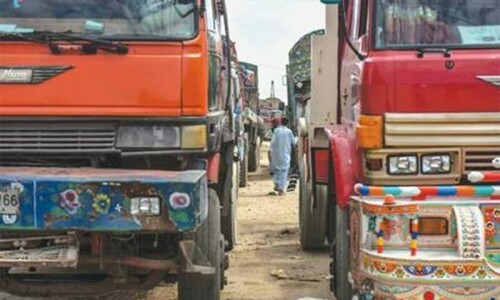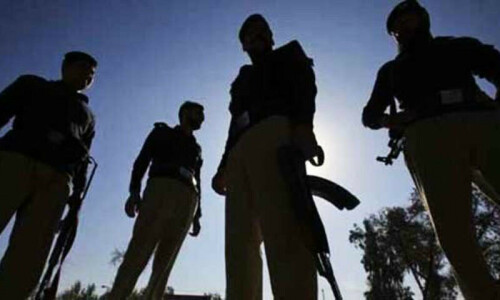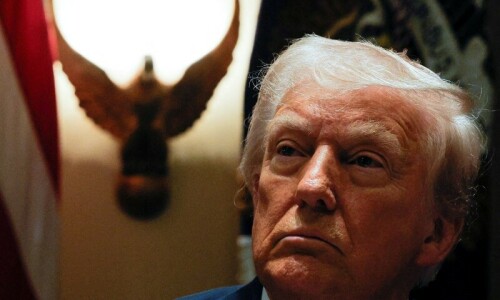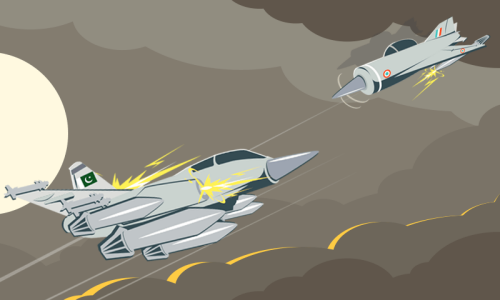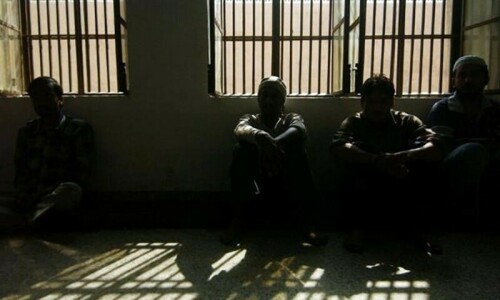KARACHI: “I wash cars and motorcycles to earn a living. I study during the day and do this work from afternoon to evening. I want to be a doctor one day but my father died and I have to take care of my mother and younger siblings. It is not enough and I wish I could do better but this is the best that I can do,” 14-year-old Yousuf Abdul Sattar told Dawn.
The young boy was the one among a large number of people asking the government to spare a thought for them during the workers’ rally organised jointly by the National Trade Union Federation (NTUF) and Home-based Women Workers Federation (HBWWF) on Sunday. Carrying red flags and red banners, they filled up the roads from Regal Chowk to the Karachi Press Club.
Fixing of minimum wage at Rs30,000/month urged
The rally included both formal and informal workers, who marched in a coordinated and disciplined manner, while observing all standard operating procedures (SOPs), on foot, on motorcycles, atop trucks and in buses while raising their demands and chanting slogans.
They complained about inflation and their meagre earnings, some cried for having lost their livelihoods altogether.
Empty metal platters were being beaten with ladles to remind the authorities of the empty stomachs of workers who even after a day’s hard work go to bed hungry at night. They complained about the risings cost of flour, ghee, sugar, rice, vegetables and inflated utility bills.
“Here even shrouds have also become expensive. Dying costs money, living costs money,” they chanted. “Go Niazi go,” they chanted. And when they were not saying anything they had motivational songs playing on loudspeakers.
Later, the very loudspeakers carried afar their woes regarding the anti-labour and anti-worker policies of the International Monetary Fund (IMF), which they called out as completely unacceptable and akin to slavery. They also condemned bids by the federal government for the “unconstitutional occupation” of Sindh’s islands.
Amir Baksh of the Ship-breaking Workers Union in Gadani said that they were still working in miserable conditions in the ship-breaking yards at Gadani.
“Despite so much written and shown about it, we the workers of Gadani are still working without any safety measures, without any health facilities, without a proper place to live and without clean water or proper food,” he said.
Other speakers also said that the government had dented the country, economically, socially and politically. They said that 220 million people here were compelled to live like animals as as the government safeguarded interests of big investors and profiteers.
“Production processes are decreasing and the purchasing power of the people is reducing but the rulers are enjoying the bliss of ignorance. They have pushed Pakistanis into slavery of the IMF as the institution’s employees rule over Pakistan like viceroys. Real inflation has jumped to 14 per cent and about 17.5 million people are jobless. Thanks to the worst-ever economic policies of this government, the country’s loans have colossally increased. Not only present Pakistanis but their coming generations have also been indebted,” said Nasir Mansoor of the NTUF.
“Important and essential entities are being privatised and thousands of workers are being rendered jobless. The worst example of this is the sacking of over 4,500 workers of Pakistan Steel Mills. The same is also being done in PIA and other organisations. And the media is also being made weaker so that sufferings of the masses due to economic collapse go unreported,” he added.
It was said that the workers felt like slaves in factories and workplaces where they were not even paid the minimum wage of Rs17,500 per month.
“And due to rupee devaluation the real wages of Pakistani labourers have dropped by 50 per cent. Informal labour has increased as factory owners do not get their workers registered with the institutions of social security and pension. They are compelled to work for many hours a week without overtime, they are deprived of their right to make labour unions and elect their collective bargaining agents (CBAs). And the police and Rangers back the illegal steps taken against them and harass them. Retired military officers employed in factories have brought in a virtual industrial martial law at factories, where discrimination against women workers is widespread and sexual harassment is also common,” Mr Mansoor added.
The speakers also pointed towards the withdrawal of state subsidies on the directives of international lending institutions and the increased rates of daily use items, edibles, utilities by 200pc.
“Today, the common man cannot feed his family two square meals as the rate of flour has risen from Rs35 to Rs75 per kilogram. This shows the height of the anti-people policies of the government. More than 35 per cent of the total population of Pakistan is living below the poverty line,” said Asad Butt of the Human Rights Commission of Pakistan.
“The government and state have failed to deal with the situation created by the [Covid-19] pandemic. Instead of giving relief to poor people, more and more perks are being offered to the elite class. The worst affected of this economic crisis is the non-organised sector and a large number of home-based workers, mostly women have become jobless. The government has left these people alone to face the virus. When it was time to provide more healthcare facilities, the government increased the prices of medicines, especially the lifesaving ones, by more than 200 per cent,” said Zehra Khan of the HBWWF.
“Sadly, besides the government, the opposition has also failed to come up with a solid strategy for the rights of workers. In order to steer the country clear from the ongoing crisis, it is necessary to shun the disastrous policies of the IMF. The constitutional rights of the provinces should be respected and their ownership on their resources and islands should be accepted,” said Aqib Hussain of the Young Naujwan Committee.
Other participants of the rally demanded that the minimum wages of workers be fixed at Rs30,000 per month.
They called for tabling agreements with the IMF in the parliament for a debate. They demanded distribution of land among peasants, or haris, so that the national economy was given a boost.
They said bids to snatch the constitutional rights of provinces were tantamount to attacking the foundations of the federation of Pakistan.
Saira Feroze of the HBWWF, Owais Jatoi of the Garment Workers Union, Saeeda Khatoon of the Baldia Association, Bashir Mahmoodani of the Ship-breaking Workers Union, Rahmat Ali of the Youth Committee, Rehman Baloch of the Shehri Awami Mahaz, Mahbood Khan of the Shipyard Action Committee, Tauseef Ahmed of Balochistan NTUF, Sajjad Zahir of Anjuman-i-Taraqqi-pasand Musanifeen, Fahim Siddiqui of the Karachi Union of Journalists, rights activist Qazi Khizar and rights leader Gul Hassan Kalmati also participated in the rally.
Published in Dawn, November 30th, 2020



